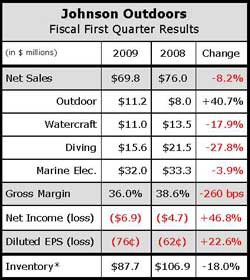Johnson Outdoors Inc. management said that disappointing holiday sales and declining consumer spending and confidence levels have “definitely made retailers more focused than ever on keeping inventory levels down.” Retailers are apparently signaling to the company that they are adjusting the timing of their orders to coincide more closely with the consumer purchases of seasonal goods.
According to JOUT, their fiscal first quarter results are not historically indicative of the year's overall performance, due to the warm-weather seasonality of the company's business, but there is attention paid to the fact that deteriorating economic conditions in key markets resulted in lower sales across three of the company's four business units for the period.

The company in December announced comprehensive cost-reduction plans which included an aggressive $20 million cost savings target, lower capital spending and significant reduction in peak working capital. In response to the feedback from retail, they are focusing on three key initiatives to address the challenges.
First, JOUT is working to align production with the timing of orders. They said they have made “a lot of progress” by focusing on their most popular and profitable models. They said the goal is to be in a position to meet market demand throughout the season and end the year with “dramatically lower” inventory levels than in the past.
Second, the company has instituted a temporary 10% reduction in employee pay and a 15% reduction in executive pay.
“No one likes to cut wages and salaries,” said company Chairman and CEO Helen Johnson-Leipold, “but under these business conditions and our focus on preserving cash, options are limited.”
The third step is based on the realization that the ongoing success of any company is predicated on its ability to grow and meet its needs today without compromising its ability to do so in the future. This resulted in an assessment of the future landscape that resulted in the elimination of 21 positions this month.
“We expect to identify further opportunities to significantly reduce our cost structure and increase our capacity to invest in key growth areas once our strategic analysis is completed,” said Johnson-Leipold.
The decline in gross margins was attributed to closeout pricing on discontinued products in Watercraft, which helped bring inventory levels down in that business. Secondly, JOUT instituted a manufacturing hiatus in the companys Indonesian operation where they have consolidated globalized computer production.
They expect to see savings of $1 million-plus in the year ahead due to these restructuring efforts.
When asked about the level of inventory reductions they expected to make, management responded that the target in the net working capital is a 12% reduction at peak, indicating that they expect most, if not all, of that to come from inventory.
For the quarter, marine electronics revenues declined primarily due to continued declines in the marine market. Watercraft sales fell due to softening paddlesports markets and a 5% impact from unfavorable currency translation, while diving revenues fell due to slowing economies in key international markets and the impact of unfavorable currency translation. Outdoor Gear sales jumped 41% ahead of last year driven by double-digit growth in all categories. The most significant growth, though, came from of a military order.















